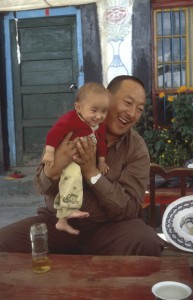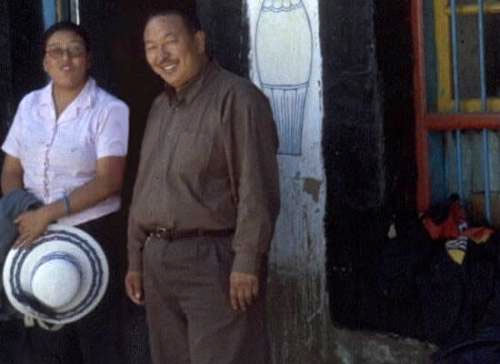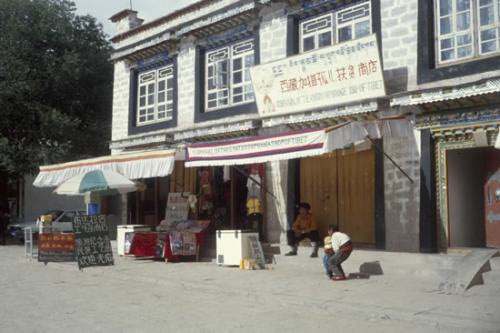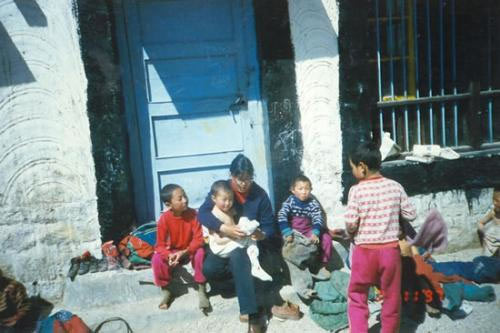
Bangri Chogtrul Rinpoche and a child from the Gyatso School.
Forty-year old Bangri Chogtrul Rinpoche, who was sentenced on charges of ‘attempting to split the country’ in 2000, has been transferred from Drapchi prison to the new prison of Chushur (Chinese: Qushui) county near Nyethang (Chinese: Nidang) of Lhasa, where the UN Special Rapporteur on Torture, Manfred Nowak, met him during his visit to the PRC from November 20 to December 2 last year (ICT report: New prison in Lhasa: increased surveillance for political prisoners, ‘oppressive’ cell-blocks). Mr Nowak also visited Bangri Chogtrul Rinpoche’s wife, Nyima Choedron, in Drapchi prison (Tibet Autonomous Region prison). Nyima’s ten year sentence for ‘splittism’ has been reduced twice and ends on February 26, 2007.
The imprisonment of Bangri Chogtrul Rinpoche (Chinese: Jinmei Danzeng Nima) and his partner Nyima Choedron, a 37-year old former nun, was linked by the Chinese authorities to an attempt by a Tibetan construction worker at the school to raise the Tibetan flag in the main square in Lhasa and to blow himself up with explosives. Gyatso, the school and home for children managed by Bangri Chogtrul and Nyima and supported by at least two charities and individual donors from the US and UK, was closed and other staff arrested and imprisoned after the same incident. Bangri Chogtrul Rinpoche and Nyima, who have a seven year old daughter who is being looked after by family, are the only two members of Gyatso staff to remain in prison in one of the most serious political cases in Tibet in recent years (ICT report: Fears for school founder in prison).
Because the authorities in Tibet have taken such stringent measures to prevent information about the case reaching the outside world – including the intimidation of Tibetans involved – full information about the sentencing of Bangri Chogtrul Rinpoche and Nyima Choedron (Chinese: Nima Quzhen) by the Tibet Autonomous Region Lhasa Municipal Intermediate People’s Court only recently became available and was reported by ICT last year. The new information obtained by Dui Hua states that Bangri Chogtrul Rinpoche’s life sentence for ‘splittism’ was commuted to 19 years on July 31, 2003, and he was granted a year’s reduction on November 17, 2005, with his sentence now due to expire on July 30, 2021 (the new sentence is measured from the date the court commuted his sentence from life to fixed-term).
All of the arrests of staff and the closure of the Gyatso school and home in Lhasa were linked by the authorities to an incident on August 26, 1999 when a Tibetan building contractor who had been working at the school, Tashi Tsering, made an attempt to pull down the Chinese flag and raise the Tibetan flag, which is banned in Tibet, in the square in front of the Potala Palace, Lhasa. Tashi Tsering then attempted to detonate explosives strapped to his body, with the intention of killing himself, which failed due to rain. Tashi Tsering was arrested and died in prison in February 2000. Soon after Tashi Tsering’s protest, a number of his relatives and associates were arrested and detained for temporary periods, and many of the staff from the Gyatso school, most of whom were known and trusted by several US and UK donors, were charged and sentenced to prison terms of varying length or served terms of ‘re-education through labor’ (laojiao).
At Bangri Chogtrul Rinpoche’s trial in September 2000 in Lhasa, the authorities charged him with conspiring in a ‘plot’ with Tashi Tsering to carry out the protest, and they also accused him of links with ‘splittist’ foreign organizations and the ‘renegade’ Tibetan exile government. Bangri Chogtrul Rinpoche had traveled to India and the West during the 1990s to raise funds for his school, which was funded by at least three organizations, including two charities in the UK and two American groups of sponsors. In his defense, at his trial in September 2000, both Bangri Chogtrul Rinpoche and Nyima said that they believed the charge of ‘splittism’ was not appropriate, but the court maintained the position that they ‘collaborated with hostile external forces over a long period of time’ and ‘participated in activities to split the country and destroy national unity’.

Bangri Tsamtrul Rinpoche and Nyima Choedron at the Gyatso school and home before their imprisonment.

The Gyatso school and home shop before it was closed down.

Helper at the Gyatso school with children, prior to the school’s closure in 1999.

